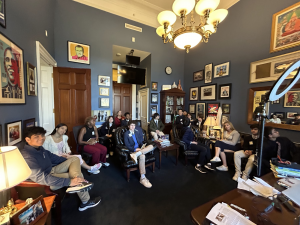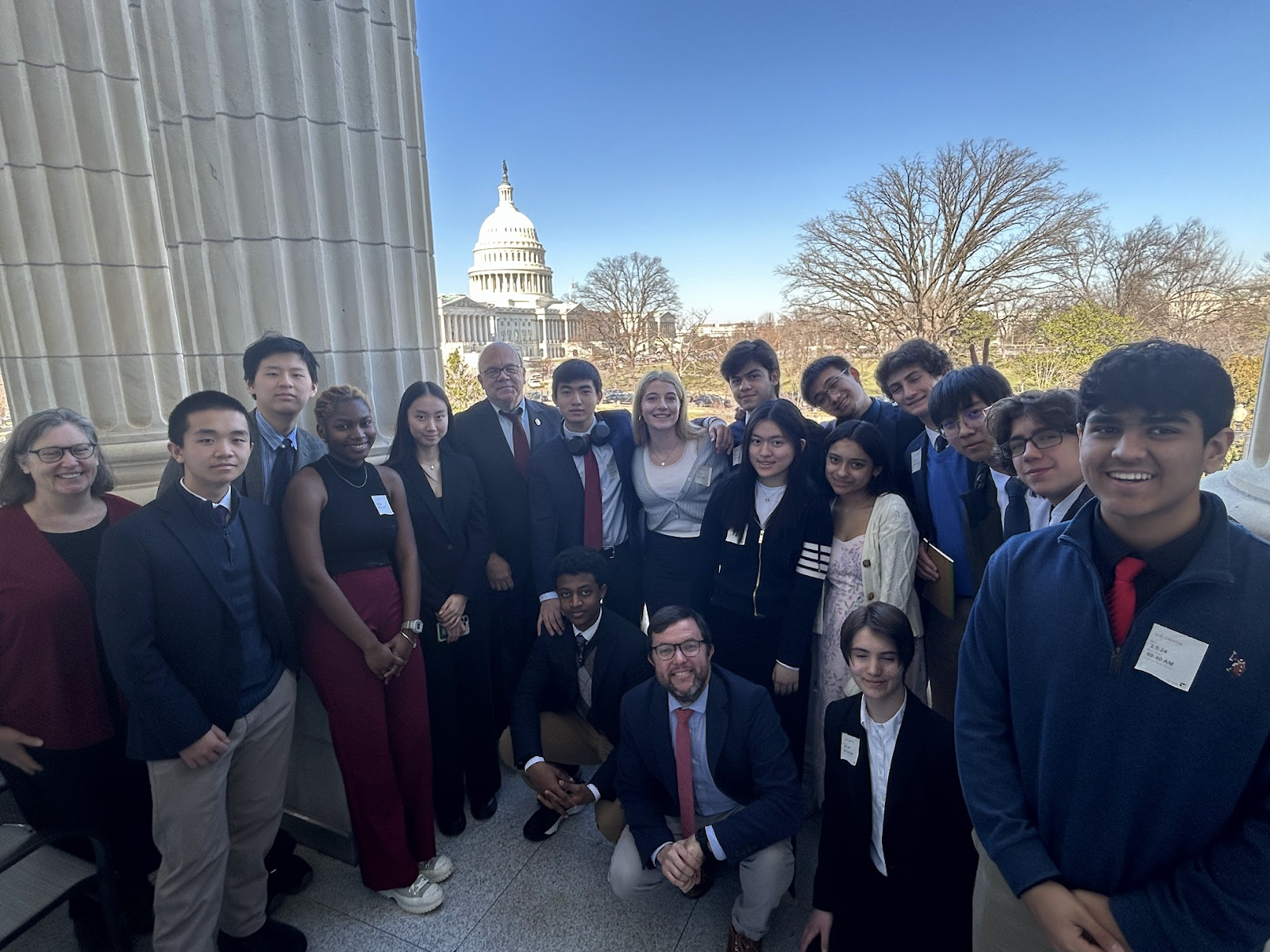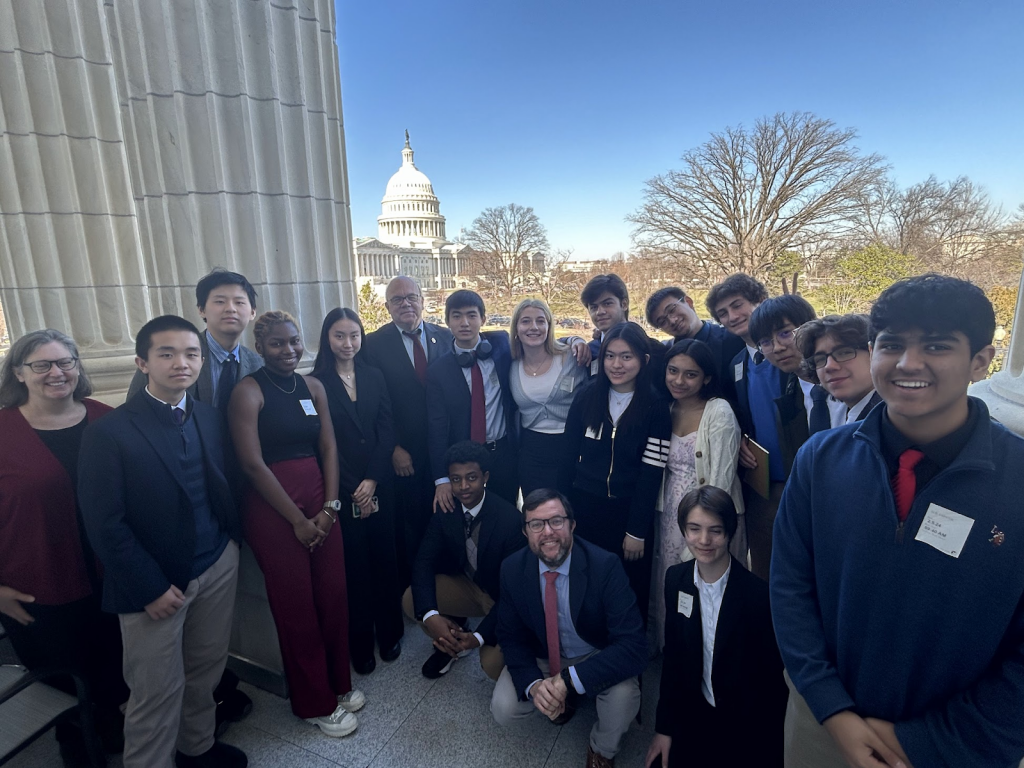Kerelle ’24
Today we arose with anticipation, eager to be in “the room where it happens.” Our time in D.C, focused on civil dialogue and democracy, sparked many insightful conversations among our group, but today we were able to see where conversations just like ours are potentially put into legislative effect: the United States Capitol. Mr. Thomas D’Aprile, legislative correspondent to Congressman James McGovern, primed us for our visit with the Massachusttes representative by leading us on a delightful tour of the Capitol and its auxiliary office buildings. Needless to say, Mr. D’Aprile was knowledgeable about the historical and architectural significance of these important buildings. The Greek and Roman-styled arches compelled us to veer our curious eyes to the vaulted ceilings of rooms such as the Capitol Rotunda. In these rooms, the legislative building transformed into an artistic sanctuary riddled with the nation’s history. Most interesting, though, was the opportunity for us to view the chamber of the House of Representatives, where our tour guide gave a second-hand account of Rep. Jim McGovern’s experience on January 6th. It may have been the powerful imagery of Mr. D’Aprile’s recounting or the ambiance of the chamber itself, but I believe I speak for the majority of my peers when I say that the events that were relayed prompted questions about the democracy that we so securely talked about in the days prior. Thus, as we roamed the building filled with “rooms where it happened,” I realized perhaps there isn’t a room or a designated place where democracy occurs. Instead, it is the responsibility of the people to maintain the ideal of democracy that the United States holds so dearly to its heart.
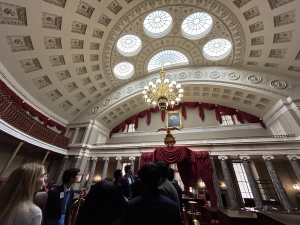
Marco ’26
Congresspeople were just returning from visiting with their constituents in their home districts as we toured Capitol Hill. After I adjusted to the looming, Greek-wanna-be arches and the ironic adjacency of the paintings Embarkation of the Pilgrims and Baptism of Pocahontas, I was surprised by the contrast of the humanity we saw and the typical image of detached politicians. Many congressional aides were just college students a few years older than us. We could feel representative Jim McGovern’s earnest concern for good government, and we also heard his phone alarm ring with a hip hop song—a funny burst of humanity. Here were passionate, real people who strive to listen and enact civic opinions. But they are just people. As the representative noted, the political democracy we expect rests on tradition, and representatives are just people we elect.
When asked what surprised them the most in their jobs, an intern replied it was “the amount of anger” from the constituents who contacted the office. Many people would call in expressing outrage or concern over political issues (civic engagement, yay!) only to conclude, “and that’s why I don’t vote” (resigning dialogue, no!). Rep. McGovern said that those who disagreed, rather than merely complain about having a “dysfunctional Congress,” should discuss and take up civic action to advocate governance.
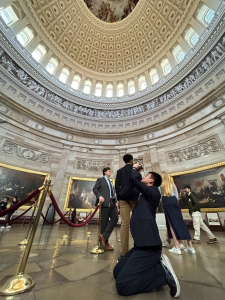
Maeve ’27
After touring the Capitol, we walked to the Cannon House Office Building where we talked with Congressman Jim McGovern, who represents Massachusetts’s 2nd District (including Deerfield). We started off our conversation talking about the policies that McGovern supports. We then discussed how to interact with people who have wildly different views from you. McGovern said that his approach is to simply be friendly and kind. This idea is not groundbreaking, but it is still true. McGovern highlighted the importance of civil discourse, one of the themes of our trip. He said that just because two people disagree does not mean one of them is evil. This is something that I and others struggle with when we are passionate about a topic. Hearing a person who is forced to constantly interact with people of different ideologies say “no one is evil” is humbling. If they can humanize everyone, we can too.
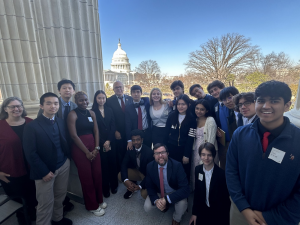
Josh ’26
In the Russell Senate Office Building, Deerfield students met with Senator Tom Cotton’s Foreign Policy Legislative Assistant Anna Hardage and two college-aged interns she supervises. During our time together, the topic of conversation remained two-fold. First, they focused on how American politics, specifically the upcoming presidential election will affect America’s relations with its foreign allies. Then, students talked with the staff about how professional connections are made on capital among staffers and interns. The answer to all questions asked to the staff boiled down to this: How are relationships made? And how are they kept? The staff responded simply: take no interaction for granted. One does not meet people simply to “check a box.” Rather, they must build strong relationships. They went on to add that one never knows what relationships may be useful—even those who answer phones for a member of Congress now might one day be in a position of power. Thus, value every and all relationships.
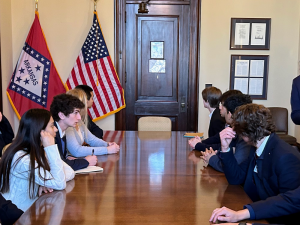
Valerie ’26
As Marco wrote, the capitol is just a building filled with people, each holding and trying to materialize varying ideals. The government is just a group of people who, by some miraculous complex of tradition and consent, collaborate to establish order. Yes, it contains variegated flaws and injustices difficult to pinpoint and fix, but it’s the people who must drive and mend the republic. It is we who must interpret what the gaping wound at the Vietnam Veterans Memorial means. It is we who must continue the pursuit of equality delineated in the National Museum of African American History and Culture. It is we who must elect those who can pass just laws on Capitol Hill. In these times, when even democracy’s legitimacy is questioned, we all the more ought to rise to the task, whether through ballot, dais, or pen.
